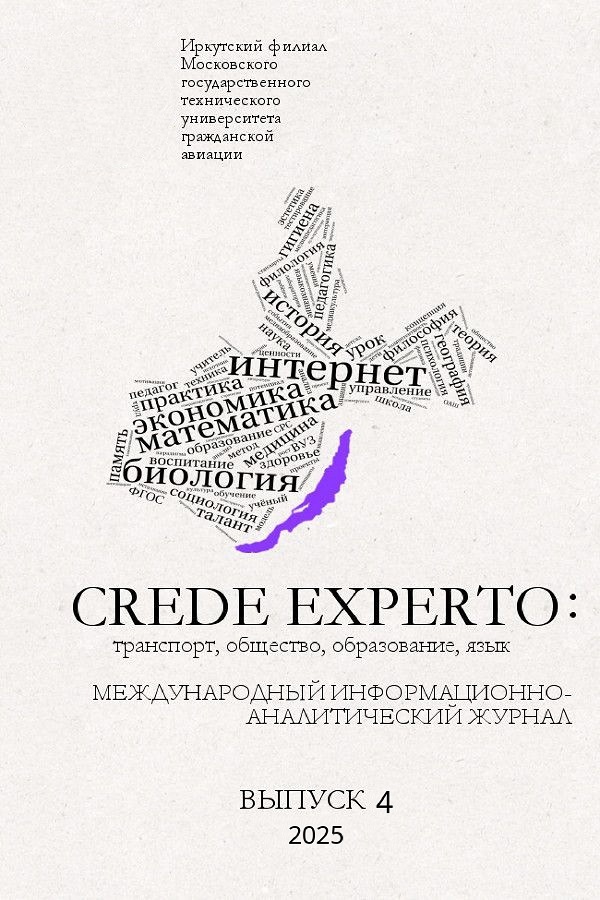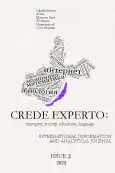Formation of Functional Literacy of Schoolchildren for Engineering-Oriented Learning (Using Examples of Building Mathematical Models of Motion)
- Authors: Bogomaz I.V.1, Chaban E.A.2
-
Affiliations:
- Krasnoyarsk State Pedagogical University named after V.P. Astafyev
- Krasnoyarsk Institute of Railway Transport (Branch of Irkutsk State Transport University)
- Issue: No 2 (2025)
- Pages: 175-189
- Section: Problems and practice of engineering education
- URL: https://bakhtiniada.ru/2312-1327/article/view/305972
- DOI: https://doi.org/10.51955/2312-1327_2025_2_175
- ID: 305972
Cite item
Full Text
Abstract
The article considers the possibility of improving the quality of mathematical education of students in Russian schools using new approaches related to the applied aspects of the studied mathematical apparatus, which are based on the principles of continuity in learning, as well as targeted, meaningful and technological continuity with other natural science academic disciplines. As a result of the conducted pedagogical research, it has been revealed that the study of functions and fundamentals of mathematical analysis, which are the basis of the mathematical apparatus for studying and mastering the laws of mechanics, is particularly difficult for high school students. In this regard, the article presents the mechanics section "Kinematics" as an interdisciplinary framework between mathematical apparatus and mechanics, formulated by L. Euler. Since knowledge of mechanics is the basis for mastering many other special engineering disciplines studied in engineering and technical universities, proposals related to the substantive part of the Federal Work Programs of Basic and secondary General Education in mathematics and physics have been made to solve the problem of continuity of standards of school and university education.
The work uses a set of theoretical and empirical research methods: analysis and synthesis, historical and logical analysis, modeling, study and generalization of pedagogical experience at school and at an engineering and technical university.
About the authors
I. V. Bogomaz
Krasnoyarsk State Pedagogical University named after V.P. Astafyev
Author for correspondence.
Email: i_bogomaz@mail.ru
Doctor of Pedagogical Sciences, Professor 89, Lebedeva street, Krasnoyarsk, 660049, Russia
E. A. Chaban
Krasnoyarsk Institute of Railway Transport (Branch of Irkutsk State Transport University)
Email: chaban_tm@mail.ru
Candidate of Technical Sciences, Associate Professor 89, str. L. Ketshoveli, Krasnoyarsk, 660028, Russia
References
- Bogomaz I. V., Teslenko V. I. (2025). Logical-content lines between physics and mathematics as a basis for professional teacher training in a modern pedagogical university. Tomsk State Pedagogical University Bulletin. 2 (238): 43-53. (in Russian).
- Bogomaz I. V. (2012). Scientific and methodological foundations of basic training of students of engineering and construction specialties in the context of a projective-informational approach: specialty 13.00.02 «Theory and methods of teaching and education (by areas and levels of education)»: dissertation for the degree of Doctor of Pedagogical Sciences / Bogomaz Irina Vladimirovna. Moscow, 2012. 290 p. (in Russian)
- Bogomaz I. V., Fomina L. Y., Chaban E. A., Rudina M. A. (2024). Improving the quality of engineering education based on the relationship between mathematics and mechanics in school education system. Engineering education. 36: 74-85. (in Russian).
- Bogomaz I. V., Peskovskij E. A., Fomina L. Yu. (2018). Formation of interdisciplinary concepts as an aspect of practice-oriented schooling. Problems of modern teacher education. 59-3: 102-109. (in Russian)
- Bogomaz I. V., Stepanova I. Yu. (2018). Mathematical knowledge as a fundamental element of propaedeutics of engineering training in secondary schools. Problems of modern pedagogical education. 59-3: 99-102. (in Russian)
- Butuzov V. F., Kolyagin Yu. M., Lukankin G. L. (2009). Mathematics. 11th grade: for the humanities. Moscow: Drofa, 2009. 240 p. (in Russian)
- Chaban E. A. (2019). Formation of professional competencies among students in the study of basic engineering disciplines. Digitalization of transport and education : Proceedings of the All-Russian Scientific and Practical Conference dedicated to the 125th anniversary of railway education in Siberia, Krasnoyarsk, October 09-11, 2019: 473-476. (in Russian)
- Chaban E. A., Strikalova N. V. (2024). Organization of independent work of students in mastering basic engineering disciplines at a railway university. Transformation of transport and Education : Proceedings of the All-Russian Scientific and Practical Conference KRIZHT IrGUPS, dedicated to the 130th anniversary of transport education in Siberia, Krasnoyarsk, October 17-19, 2024: 373-377. (in Russian)
- Decree of the Government of the Russian Federation dated 26.12.2017 № 1642 (as amended on 27.02.2023) «On Approval of the State Program of the Russian Federation «Development of Education» (2023). Available at: https://www.consultant.ru/ document/cons_ doc_LAW_286474/ (accessed 13 Marсh 2025). (in Russian)
- Euler L. (1938). Fundamentals of point dynamics. The first chapters from the Theory of Motion of Solids. Moscow: Main Editorial Office of the Technical and Theoretical literatures, 1938. 469 p. (in Russian)
- Federal working program of basic general education «Physics» (basic level) (for grades 7-9 of educational organizations) (2023). Available at: https://edsoo.ru/wp-content/uploads/2023/08/20_%D0%A4%D0%A0%D0%9F-%D0%A4%D0%B8%D0%B7%D0%B8%D0%BA%D0%B0_7-9-%D0%BA%D0%BB%D0%B0%D1%81%D1%81%D1%8B_%D0%B1%D0%B0%D0%B7%D0%B0.pdf (accessed 12 Marсh 2025). (in Russian)
- Kolyagin Yu. M. (2001). Russian school and mathematical education. Moscow: Prosveshchenie, 2001. 318 p. (in Russian)
- Kostenko I. P. (2011). Dynamics of the quality of mathematical education. Causes of degradation (article one). Mathematical education. 2 (58): 2-13. (in Russian)
- Kostenko I. P. (2014). 1956-1965. Preparation of the second «fundamental» reform of the Soviet school: the «restructuring» of programs and the «scientific» justification of false ideas (article four). Mathematical education. 2 (70): 2-17. (in Russian)
- Lerner I. Ya. (1976). Didactic system of teaching methods: Monograph. Moscow: Znaniye, 1976. 64 p. (in Russian)
- Teslenko V. I., Prokop'eva N. V. (2021). Methodological bases of designing an individual trajectory of continuing professional education. Innovations in education. 7: 66-74. (in Russian)
Supplementary files










